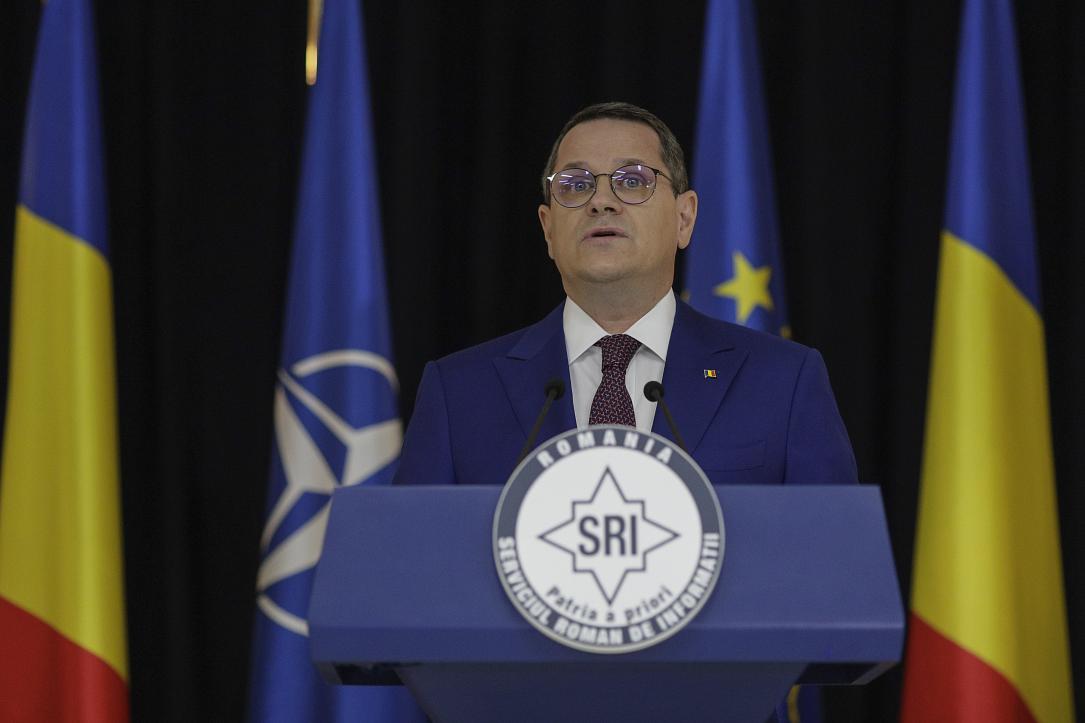Head of Romanian Intelligence Service resigns, citing “gesture of democratic health”



The head of the Romanian Intelligence Service (SRI), Eduard Hellvig, announced on Monday, July 3, that he is ending his 8-year term as director of the agency. He was appointed to the position on March 3, 2015, at the proposal of president Klaus Iohannis.
“It is healthy for a director of services to have a limited mandate. It is a gesture of democratic health,” said Hellvig.
His duties will be taken over by his deputy, general Răzvan Ionescu.
During his departure speech, Hellvig recalled the report that SRI sent to the Parliament in 2022 presenting the ways in which the service transformed.
“I believe it is important for society and citizens to know that SRI has undergone major transformations in these years in order to act more efficiently and adapt to current challenges, to protect Romania. We are at the end of a very important process of reconfiguring all the components of SRI, both at the local and regional levels. It has been a process aimed at providing the institution with an integrated conceptual security system, as well as increasing its effectiveness in preventing and countering threats to national security,” he said, cited by Digi24.
According to the former director, SRI has become a modern, flexible, and less bureaucratic institution by reorganizing its territorial structure and by focusing on objectives of national security. Hellvig also noted the importance of separating the service he headed from the communist-era Securitate.
“The modernization of the institution has been accompanied by other steps that, over these years, have meant a separation from the legacy of the old Securitate, the introduction of courses on totalitarianism and democracy for new employees, and the complete transfer of archives to the National Council for the Study of the Securitate Archives (CNSAS). […] We cannot always look forward if we constantly return to the past to solve the unresolved problems of previous generations. We cannot always expect future generations to solve the problems that we have not solved,” he said.
During the same speech, Eduard Hellvig admitted to discussing his resignation with president Iohannis.
“It is a wrong custom in our country for those in positions of power to leave them only at the last moment, possibly forced to do so. Most of those in power do not relinquish it when they achieve their objectives, for various reasons. Personally, I believe that such a step is needed. It is primarily a gesture of democratic health, which I have unequivocally argued for since the first year of my mandate. It is healthy for democracy, for the balance of powers in the state, that an intelligence service director has a limited term in office. Stagnation in office is not good; it can lead to setting wrong objectives for the institution, losing touch with social reality, and confusing the function with the person who holds it,” the former SRI director said.
Hellvig also expressed his belief that the renewed SRI will maintain and enhance the trust and respect of external partners and will be more transparent with its accomplishments. “I believe that the future of the SRI will be a good one for Romania if the institution avoids the mistakes and abuses of the past, and maintains its democratic and professional course, which have earned the admiration and respect of its partners in the country, the EU, and NATO."
The same day, president Klaus Iohannis decorated the outgoing SRI director with the National Order 'The Star of Romania' in the rank of 'Commander'.
Iohannis stated that Hellvig’s mandate “marked the restoration of the credibility of the SRI and the consistent modernization of the institution.” He also added that SRI “has once again become an institution guided by the democratic principles of the separation of powers in the state, its activities now taking place within the limits set by the Constitution and focusing on its missions clearly defined by legislation in the field of national security,” according to Digi24.
From 1998 to 2000, Eduard Hellvig was a political adviser to former Liberal (PNL) vice president Horia Rusu and minister of interior Constantin Dudu Ionescu, as well as an adviser to presidential candidate Mugur Isărescu. In 2004, he was elected as a deputy for Bihor in the Parliament of Romania, during which time he served as secretary of the Committee for Defense, Public Order, and National Security and as a member of the NATO Parliamentary Assembly.
Hellvig was elected in 2006 to be one of Romania's first Members of the European Parliament. From 2008, he was a member of the National Liberal Party, and in 2009 he became the adviser to PNL president Crin Antonescu. In 2012, he was part of the Victor Ponta government as Minister of Regional Development and Tourism. In the December 2012 parliamentary elections, he was elected as a deputy in Ilfov.
Eduard Hellvig was the vice president of the Chamber of Deputies and a member of the Committee for European Affairs and the Romanian Delegation to the NATO Parliamentary Assembly. On September 3, 2013, he resigned from the Parliament to take over the mandate of a Liberal MEP. Later on, he was the campaign manager for Klaus Iohannis in the 2014 presidential elections.
(Photo source: Inquam Photos | Octav Ganea)